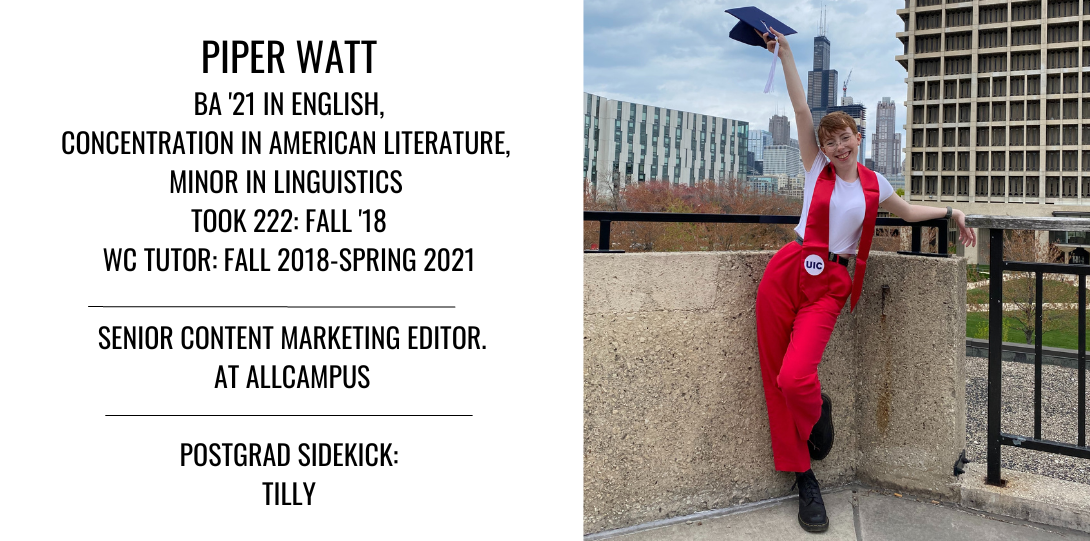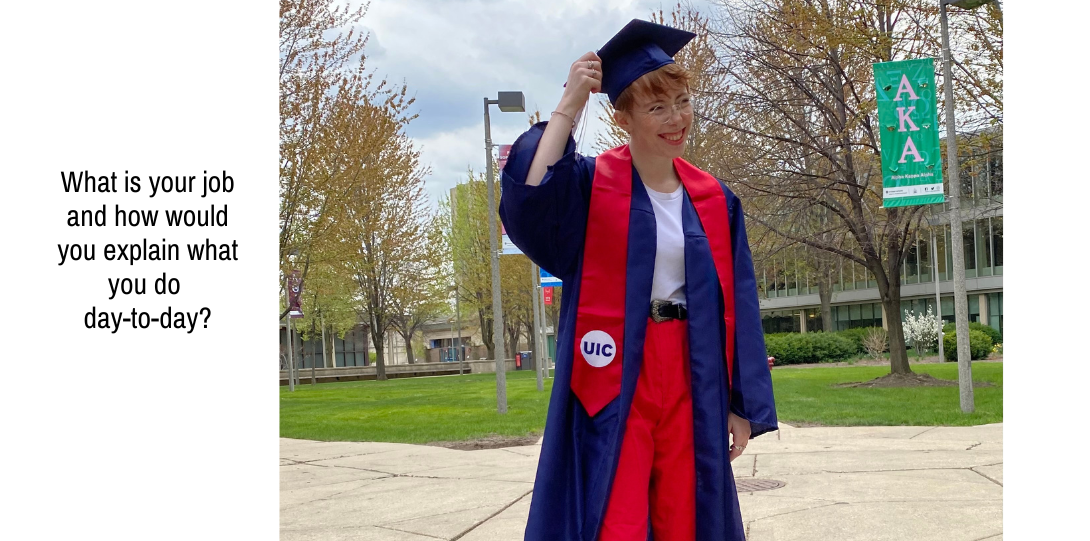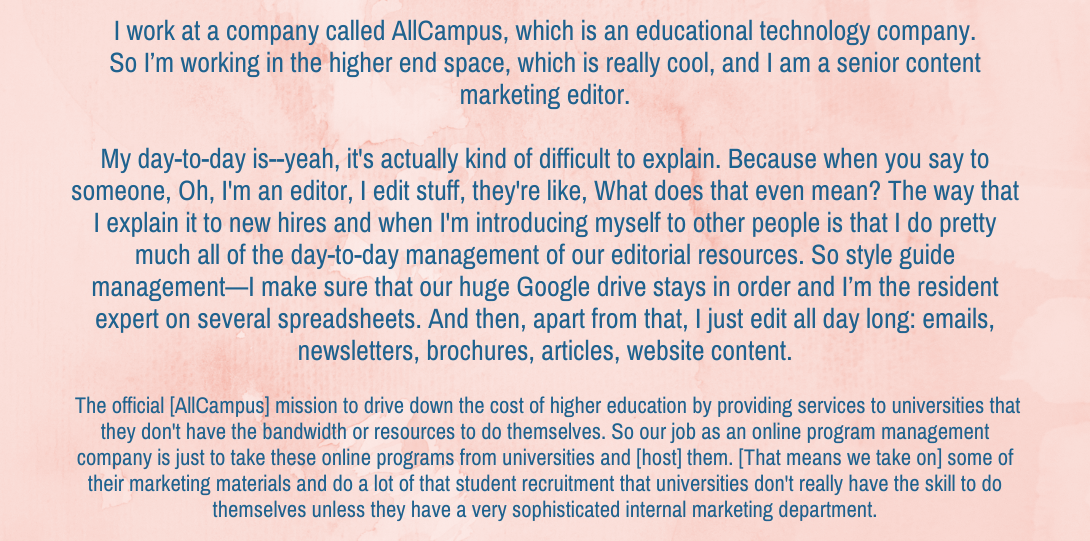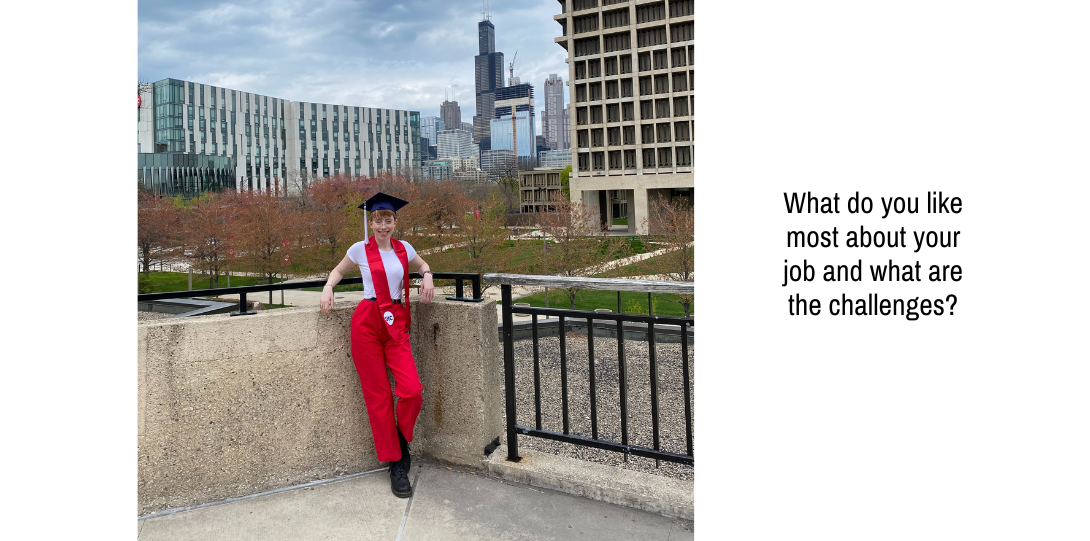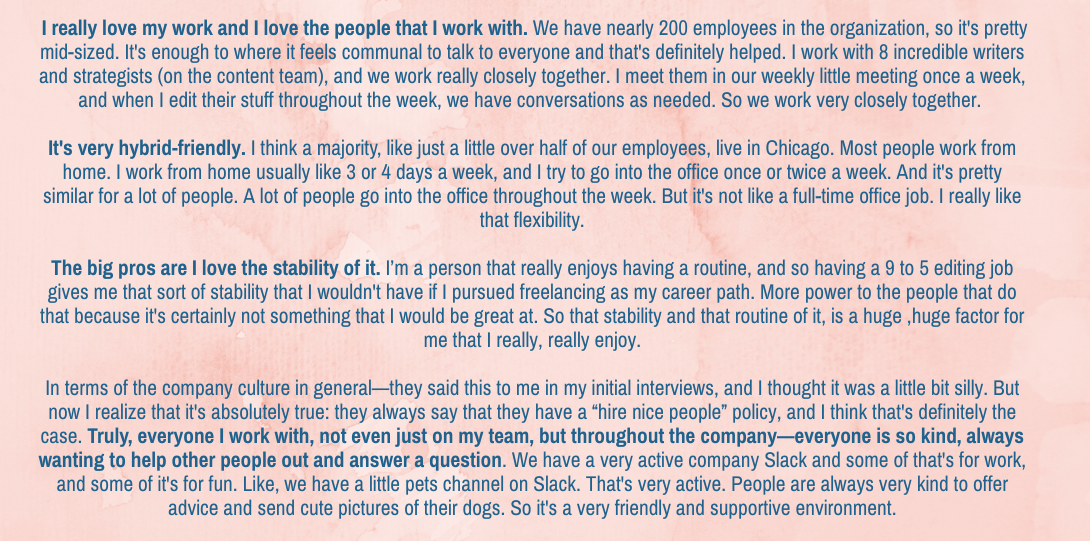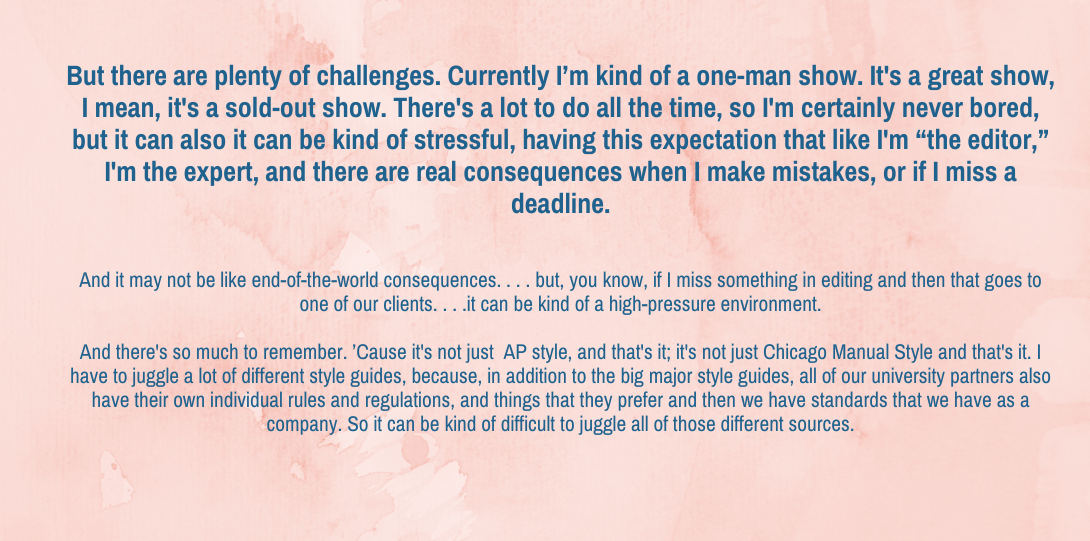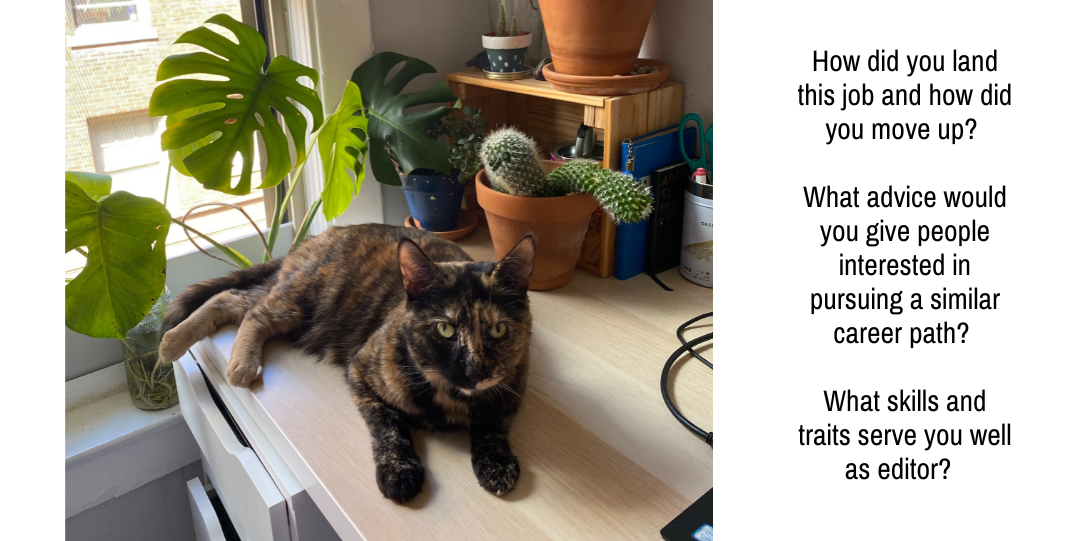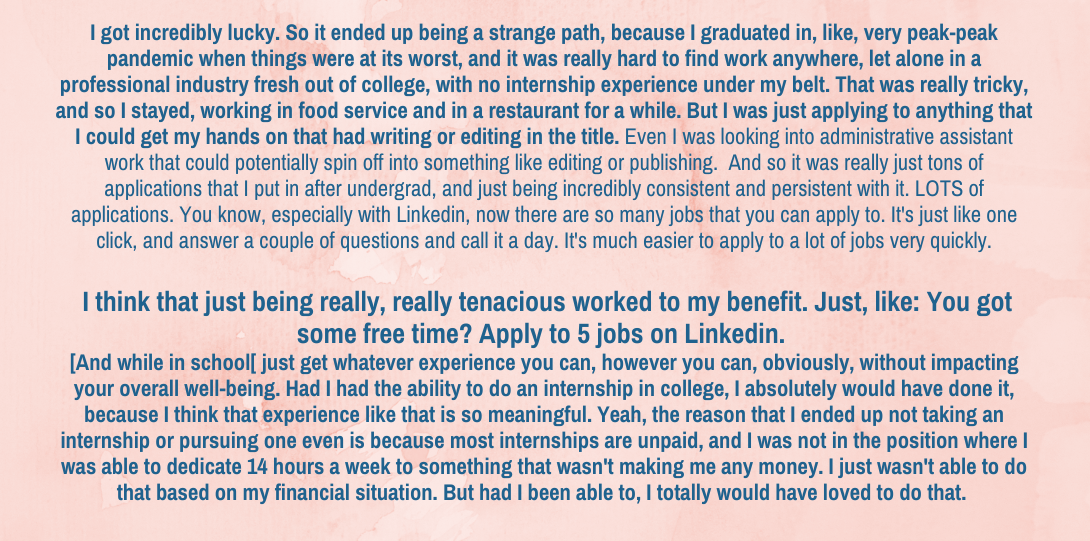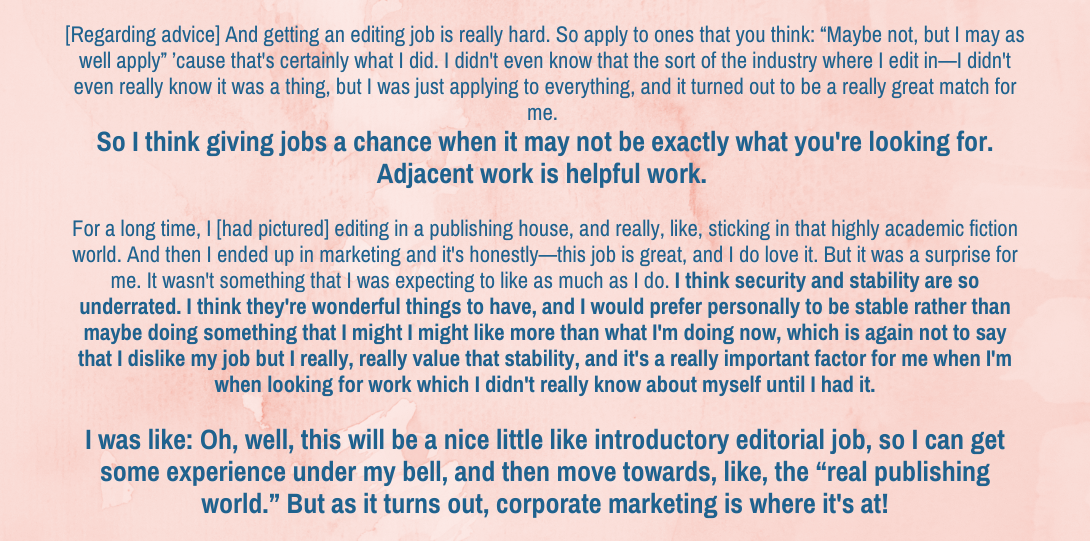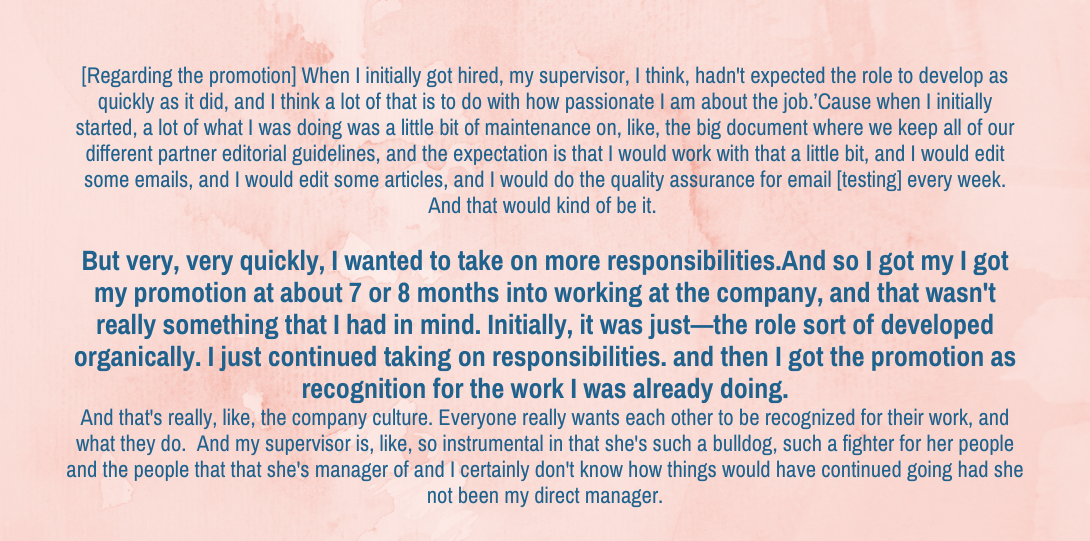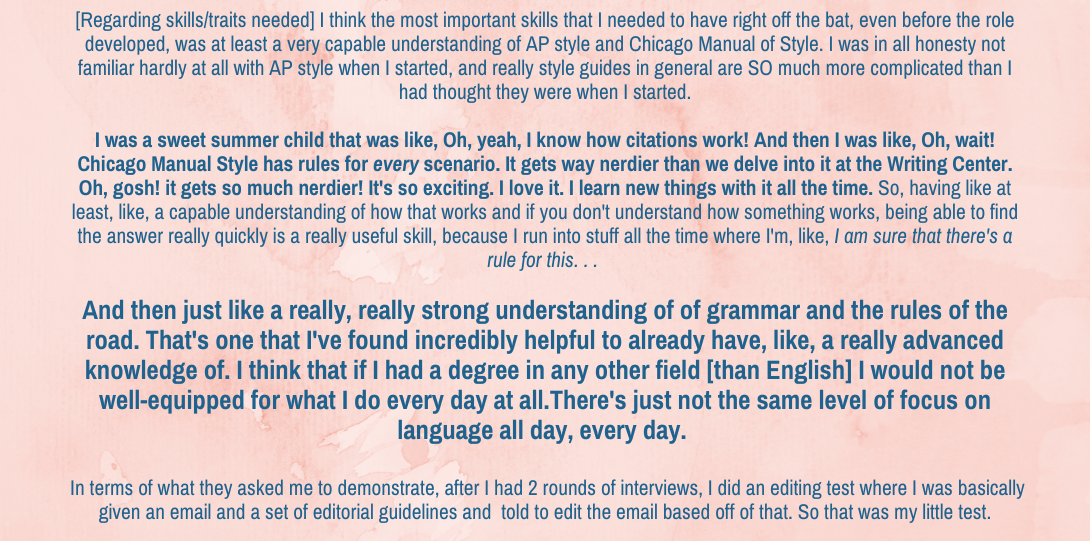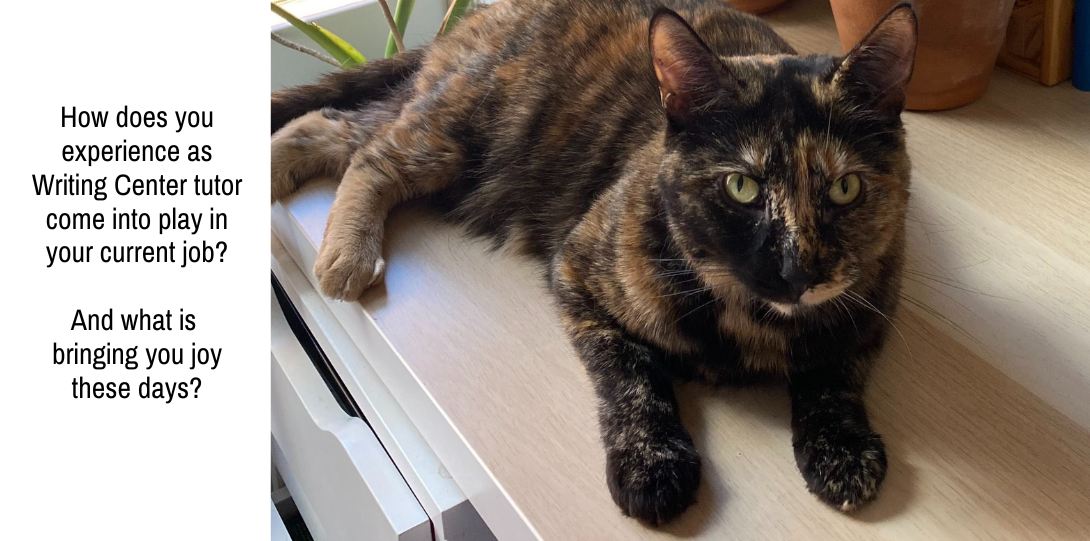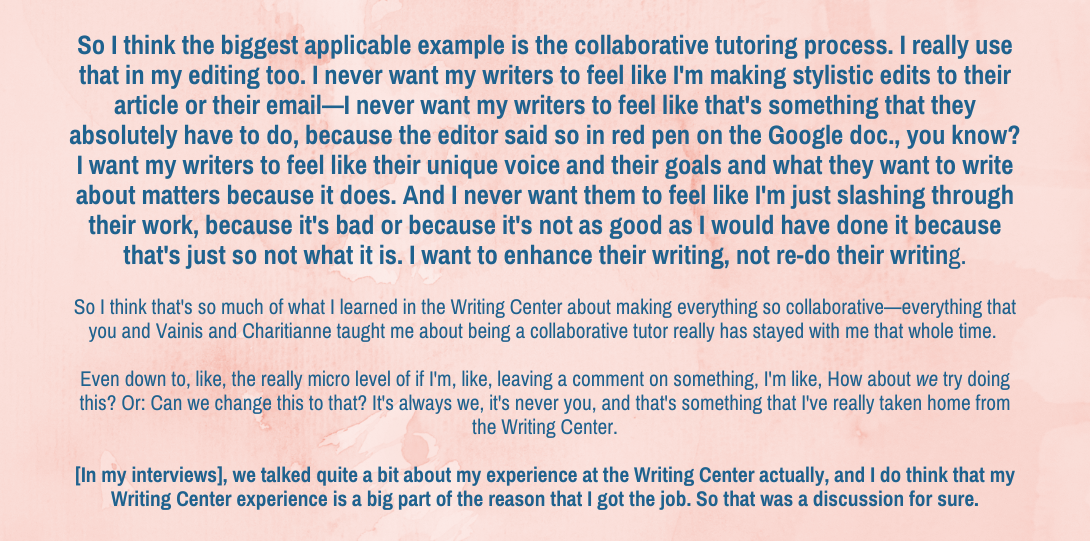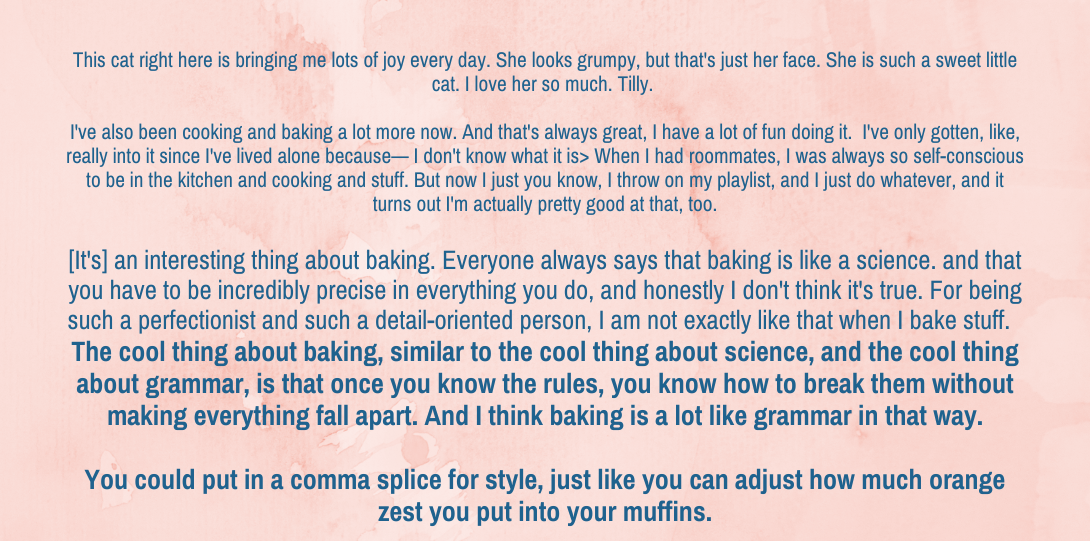Piper Watt, Writing Center Tutor Alumni Profile
10/26/22 Interview with UIC Writing Center Tutor ‘21 alumna, Piper Watt
10/26/22 Interview with UIC Writing Center Tutor ‘21 alumna, Piper Watt
- Pronouns: they/them
- Graduated: BA 2021 in English, concentration in American literature; minor in Linguistics
- Took 222: F18 with Kim
- Tutored: S18-S21
- Now: Senior Content Marketing Editor at AllCampus, an educational technology company
Where are you and what are you doing these days for work?
I work at a company called AllCampus, which is an educational technology company.
So I’m working in the higher end space, which is really cool, and I am a senior content marketing editor.
And how would you explain your work to someone unfamiliar with what that world is like? What do you do day-to-day in your job?
Yeah, it’s actually kind of difficult to explain, Because when you say to someone like, Oh, I’m an editor, I edit stuff, they’re like, what does that even mean ?
So my day-to-day is—the way that I explain it to new hires and when I’m introducing myself to other people—is that I do pretty much all of the day-to-day management of our editorial resources. So style guide management—I make sure that our huge Google drive stays in order and I’m the resident expert on several spreadsheets. And then, apart from that, I just edit all day long: emails, newsletters, brochures, articles, website content.
That’s helpful to know. And what would you say is the mission of your organization?
So the official mission is to drive down the cost of higher education by providing services to universities that they don’t have the bandwidth or resources to do themselves.
So our job as an online program management company is just to sort of take these online programs from universities and [host] them. [That means we take on] some of their marketing materials and do a lot of that student recruitment that universities don’t really have the skill to do themselves unless they have a very sophisticated internal marketing department.
So is this partly about reaching students who might not otherwise naturally be heading for post-secondary education? Or are there certain target groups that you’re trying to reach?
Yeah, that’s a great question. So we only work with online programs, and it’s kind of hard to find online programs—even now, when there’s so many options mid-pandemic.
So it’s reaching a broader audience across the country that wouldn’t otherwise be familiar with the specific programs, or even the universities at large. Like, we work with some big brand name universities, but we also work with some small regional universities like Lynn University and Boston University, that are a little bit smaller, maybe not as well known.
And we host programs for them and help them reach more students that they would be able to do on their own.
What would you say is the size and scale of your operation? And are you generally working in person or remotely?
Yeah, so we have nearly 200 employees in the organization, so it’s pretty mid-sized. It’s enough to where it feels communal to talk to everyone and that’s definitely helped.
It’s very hybrid-friendly. I think a majority, like just a little over half of our employees, live in Chicago. Most people work from home. I work from home usually like 3 or 4 days a week, and I try to go into the office once or twice a week. And it’s pretty similar for a lot of people. A lot of people go into the office throughout the week. But it’s not like a full-time office job. I really like that flexibility, yeah.
I know you were always very interested in editing, and there were probably different venues you could have gone into. So how did you come to this work? Can you describe your path a little bit?
I got incredibly lucky. So it ended up being a little strange of a path, because I graduated in, like, very peak-peak pandemic when things were at its worst, and it was really hard to find work anywhere, let alone in, like, a professional industry fresh out of college, with no internship experience under my belt.
That was really tricky, and so I stayed, working in food service and in a restaurant for a while.
But I was just applying to, like, anything that I could get my hands on that had writing or editing in the title. Even, like, I was looking into administrative assistant work that could potentially spin off into something like editing or publishing.
[For a long time I imagined] working in editing in a publishing house, and really, like, sticking in that highly academic fiction world.
And then I ended up in marketing and it’s honestly—this job is great, and I do love it. But it was a surprise for me. It wasn’t something that I was expecting to like as much as I do.
I was like: Oh, well, this will be a nice little like introductory editorial job, so I can get some experience under my bell, and then move towards, like, the “real publishing world.”
But as it turns out, corporate marketing is where it’s at!
And so it was really just tons of applications that I put in after undergrad, and just being really consistent and persistent with it. And not wanting to work in food service anymore, right? Yeah. So LOTS of applications.
How do you feel about the job—what do you like, and what are the challenges?
It’s great. I really love my work and I love the people that I work with.
The big pros are I love the stability of it. I’m a person that really enjoys having a routine, and so having a 9 to 5 editing job gives me that sort of stability that I wouldn’t have if I pursued freelancing as my career path. More power to the people that do that because it’s certainly not something that I would be great at. I do continue to do my freelance work, but certainly not full time. So that stability, and, like, that routine of it, is a huge, huge factor for me that I really, really enjoy.
But there are plenty of challenges. Currently I’m kind of a one-man show.
Yeah, I bet it’s a very good show, though.
It is a great show, I mean, it’s a sold-out show. Yeah, there’s a lot to do all the time, always something to be done, so I’m certainly never bored but it can also it can be kind of stressful, having this expectation that like I’m “the editor,” I’m the expert, and there are, you know, real consequences when I make mistakes, or if I miss a deadline.
And it may not be like end-of-the-world consequences. . . . But, you know, if I miss something in editing and then that goes to, like, one of our partners. one of our clients. then they see that, and they’re like, Oh, this company, they made a mistake, they didn’t capitalize “About” in this headline! So it can be kind of a high-pressure environment.
And there’s so much to remember. That, I think, is another big thing. ’Cause it’s not just like AP style, and that’s it; it’s not just Chicago Manual Style and that’s it. I have to juggle a lot of different style guides, because, in addition to, like, you know, the big major style guides, all of our university partners also have their own individual rules and regulations, and things that they prefer and then we have standards that we have as a company that we also have to make sure we’re including in our work. So it can be kind of difficult to juggle all of those different sources.
That makes me wonder—this might be a dumb question—but you are not writing, you are exclusively editing, if I understand it right? Whose writing then do you edit? Are there in-house writers who are creating the content, and how closely do you work with them?
Great question. So we pretty much do everything from, like, the very beginning all the way through managing sites after we’ve launched a program.
So we do have our content team. I work with eight incredible writers and strategists, and we work really closely together.
And we do outsource [too], and we do have some freelancers. Some freelancers write pieces for us, but for the most part it’s our in-house writing team, and, you know, we’re kind of on the same team.
So I meet them in our weekly little meeting once a week, and you know, when I edit their stuff throughout the week, and we have conversations as needed. So we work very closely together.
How would you characterize the temperaments that might be better suited for editor vs. writer? [As an English major and former tutor,] you could certainly do either. But you’re drawn more to the editor role. What do you think people should bear in mind if they’re thinking about applying to either type of position?
Yeah, I think my strengths and my talents and what I’m skilled at definitely lean more towards the editor role. I know that this isn’t true because it’s not true for anybody.
But I always say that I’m not a particularly creative person.
I know that I am creative by nature. But I think what it is is that I find it difficult, especially in this marketing world that I live in, is I find it kind of difficult to NOT be so academic with everything.
So I think if I were to pursue a writing role, I would be much better suited to academic writing than towards this, like, marketing world.
But as an editor I think the strengths that I have that are most helpful for me, and that would likely be really helpful for people if they were thinking about maybe pursu[ing]. . . . I’m an incredibly detail-oriented person. I’m a huge perfectionist. I’m the type of person where I understand that the big picture matters. However, I prefer not to focus on it. I prefer to focus on the commas.
That’s a good way to put it.
Yeah, yeah. So I think that’s the big difference, at least on our team, between the writing and the editing [staff].
And obviously it’s totally possible to do both; I’m not that person. But we have a couple of people on our team, like my supervisor, for instance. She started out as a writer and then basically developed the editorial department. It feels strange to call it “the department” when it’s just me. But she basically developed the editorial department. And now she’s managing the content function of the company.
So it’s definitely possible to do both and to excel in both. But if you like one more than the other, then do that one, you know.
Yeah, that makes sense. When you were saying that it’s about 8 writers and you, and it’s about 200 people total—another thing I think about is the culture of particular companies. How would you maybe characterize the culture? Is it very youth-oriented? Is it a lot of people who are new graduates?
Yeah, I’d say in terms of, like, demographics, it really runs the gamut in terms of age range. We are a relatively young company, I would say. We lean towards the younger side. A lot of our management is younger. And then there’s a handful of us in, like, our twenties, and early and mid-twenties and then quite a few people that are 50-plus and still vibing and and really enjoying their work.
So in terms of that, it is a really big, big spread which is really nice, and I think it’s incredibly helpful to have that sort of spread of age because I’ve learned a lot of different things from different people that have much more experience than I do.
But in terms of, like, the company culture in general—they said this to me in my initial interviews, and I thought it was a little bit silly. But now I realize that it’s absolutely true: they always say that they have a “hire nice people” policy, and I think that’s definitely the case.
Truly, everyone I work with, not even just on my team, but throughout the company—everyone is so kind, always wanting to help other people out and answer a question.
We have a very active company Slack and some of that’s for work, and some of it’s for fun. Like, we have a little pets channel on Slack. That’s very active. People are always very kind to offer advice and send cute pictures of their dogs So it’s a very friendly and supportive environment.
And it sounds like when you started. you came in at a lower position. But there was an opportunity for mobility and you’ve advanced to a senior role. So I was curious also: what were they looking for when hiring? What kind of portfolio or evidence did you need to demonstrate the skills they wanted as editor? And then, what did it take to move up?
Yeah, so when I initially got hired, my supervisor, I think, hadn’t expected the role to develop as quickly as it did, and I think a lot of that is to do with how passionate I am about the job.
’Cause when I initially started, a lot of what I was doing was a little bit of maintenance on, like, the big document where we keep all of our different partner editorial guidelines, and the expectation is that I would work with that a little bit, and I would edit some emails, and I would edit some articles, and I would do, like, the quality assurance for email [testing] every week. And that would kind of be it.
But very, very quickly, I wanted to take on more responsibilities.
And so I got my promotion. I got my promotion at about 7 or 8 months into working at the company, and that wasn’t really something that I had in mind. Initially, it was just—the role sort of developed organically. I just continued taking on responsibilities. and then I got the promotion as recognition for the work I was already doing.
But I think the most important skills that I needed to have right off the bat, even before the role developed, was at least a very capable understanding of AP style and Chicago Manual of Style.
I was in all honesty not familiar hardly at all with AP style when I started, and really style guides in general are SO much more complicated than I had thought they were when I started.
I was a sweet summer child that was like, Oh, yeah, I know how citations work. And then I was like, Oh, wait! Chicago Manual Style has rules for every scenario. When you use a hyphen, right? Yeah, it gets way nerdier than we delve into it at the writing center. Oh, gosh! it gets so much nerdier!
It’s so exciting. I love it. I learn new things with it all the time.
So, having like at least, like, a capable understanding of how that works and if you don’t understand how something works, being able to find the answer really quickly is a really useful skill, because I run into stuff all the time where I’m, like, I am sure that there’s a rule for this. . .
One that came up recently, was in the subject line of an email or in the headline of an article: How to use the word versus? Like “this degree versus this degree”? Do you spell out the word? Do you do vs. with a period. With no period, okay! And there’s a rule for everything.
It turns out, in headlines. . .
It’s, yeah, in headlines., it’s encouraged to use the vs no period with AP Style. So, being able to find answers, and like, really just kind of have a knack for research is really useful in my role.
And then just like a really, really strong understanding of of grammar and the rules of the road.
That’s one that I’ve found incredibly helpful to already have, like, a really advanced knowledge of. ‘Cause like I could always still find the answers, you know, if I don’t understand. But having, like, a really solid understanding of grammar, sentence, structure, composition when I started was really useful.
Did they ask you to demonstrate that knowledge in a particular way? Or go on your past experiences as a freelance editor? You mentioned also that you were working in academic publishing for a while. Was that in your freelance capacity?
The closest that I’ve gotten to academic publishing with my thesis that I did with Vainis, which isn’t published. but certainly is fancy.
But in terms of what they asked me to demonstrate it. . .
So right off the bat, my experience in professional proficiencies are all on my resume. So that’s all there in my interviews. We talked quite a bit about my experience at the Writing Center actually, and I do think that my Writing Center experience is a big part of the reason that I got the job.
So that was a discussion for sure. And then, after I had two rounds of interviews, then I did an editing test where I was basically given an email and a set of editorial guidelines and then told to edit the email based off of that. So that was my little test.
Was that fun, or was it nerve-wracking?
It was super nerve-wracking, Not because I doubted my abilities, but because at this point I had had two interviews, and I was so enamored with my supervisor, as I still am now. She’s so wonderful and great to work with. And I was like, I really want this job, like really, really, badly.
I really like this job, and so I think a lot of the nerves were just from that of being, like: I really want this job, and I know that I don’t have a ton of experience, and that I’m a young person fresh out of college. But please give me the job!
And you pulled it off! That’s wonderful. Congratulations.
I pulled it off. I’m assuming that they don’t regret it, considering that I’ve been there for a little over a year now and they still seem to like me.
And it’s also heartening to hear that they recognize that you took initiative to take all these extra responsibilities. And they could have just been like, Well, great, let her keep working beyond her pay grade. But they were like, actually, we’re gonna recognize this and give you the title you deserve, which I think speaks well of them as an employer?
Yeah, absolutely. And that’s really, like, the company culture. Everyone really wants each other to be recognized for their work, and what they do.
And not to sing her praises too much, but again, my supervisor is, like, so instrumental in that she’s such a bulldog, such a fighter for her people and the people that that she’s manager of and I certainly don’t know how things would have continued going had she not been my direct manager.
Because I didn’t even really ask for the promotion. We had sort of talked about my career path with the company. But I meant like a 5-year plan, not, like, we’re giving you a promotion next week.
Do you now have a vision of where you’d like to go next? Are you wanting more of a supervisory role in the future?
I would definitely. It’s kind of scary, the idea of managing people. It’s very scary and spooky, but I would like to do it, so I think that’s sort of the next step is [becoming] my supervisor. When I started, she was the editorial manager, and then she was promoted to the Director of the Content Department. So my next step, I guess, would be to become the editorial manager and do her old job, and that would entail ideally having a small and strong team of incredible editors.
And that would just kind of entail, obviously, direct people management, but also a lot more project management and delegation of tasks than I do right now.
Yeah, so that’s kind of the next step. Beyond that, I’m not quite sure. I haven’t looked that far ahead. But that’s next.
Because you mentioned the Writing Center, I’ll use that as my slick segue to ask you my question, which is: how does your experience as a writing tutor at the Center come into play your current role? What seems to transfer? What is applicable?
So I think the biggest applicable example, other than just, like, you know, everything, is the collaborative tutoring process. I really use that in my editing, too. I never want my writers to feel like I’m making stylistic edits to their article or their email—I never want my writers to feel like that’s something that they absolutely have to do, because the editor said so in Red Pen on the Google Doc., you know? I want my writers to feel like their unique voice and their goals and what they want to write about matters because it does. And I never want them to feel like I’m just slashing through their work, because it’s bad or because it’s not as good as I would have done it because that’s just so not what it is. I want to enhance their writing, not redo their writing.
So I think that’s so much of what I learned in the Writing Center about making everything so collaborative—everything that you and Vainis and Charitianne taught me about being a collaborative tutor really has stayed with me that whole time.
Even down to, like, the really micro level of if I’m, like, leaving a comment on something, I’m like, How about we try doing this? Or: Can we change this to that? It’s always we, it’s never you, and that’s something that I’ve really taken home from the Writing Center.
That will make the WC directors very happy!
As it should.
I understand that it’s mostly async feedback that you’re giving rather than doing a live sync session where you’d say let’s read and discuss it together?
Yeah.
And it sounds like, even though you said a good majority of the people are in Chicago, not everybody is?
Yeah, people work all throughout the country. Like, my supervisor works in L.A., she’s in California. So where we have three different time zones represented on the content team And we have people working all throughout the country. Yeah, though, for the most part [we’re] in Chicago and the greater Chicago area.
Despite the timezone spread, from when you were describing the Slack chat, it sounds like you’re not wanting for a sense of a social network or community? It’s not too isolating? Like if people were like, “I’m also kind of alone at this point in my life, it would be nice to make friendships through work as well,” does it feel like you can do that?
You absolutely can and I totally have. So, it’s very collaborative, very open for discussion. You know, there’s lots of places throughout the work that [have] opportunity for, like, “not-work” conversations that happen online.
They do in-person events and stuff, but, like, out of respect for all the people who can’t come into the office because they live four states away, there’s lots of opportunities for that online. There’s this extension, basically, on Slack called a “donut” that’s basically like an assigned meet-and-greet. So it’s like every 2 weeks you get assigned some random person from the company, and then you have a 15 minute chat, and you get to know each other a little bit.
There’s virtual events—we did Bingo for the holiday season last year which was awesome. Our accounting manager, Dan, he livestreams his record collection on Fridays. Yeah, he, like, attaches his record player to some software, and then it can play on a radio that anyone in the company can listen to with a link.
There’s so many options for that. And I’ve certainly made friends on an in-person level of people that I work with at the company. For example, I’m in a writers’ group with a couple of the other people that I work with, and we meet every other Saturday, and get together and have little writing sessions and workshops and so that’s been a huge opportunity for connection not just with some people I work with, but also friends of friends have joined, and it’s kind of a whole thing now that started because of my job.
I can see how that would be particularly appealing (for former tutors) because there are so many people who want to continue a creative writing practice or other writing practices. What advice would you give to people interested to pursue a similar path?
So it’s so difficult because I feel like I just got so incredibly lucky, and I knew that you were gonna ask me if I had any advice for people who are tutors that would want to go into editing, so I’ve been thinking about this one today, and I think what I’ve sort of landed on is just get whatever experience you can, however you can, obviously, without impacting your overall well-being.
Had I had the ability to do an internship in college, I absolutely would have done it, because I think that experience like that is so meaningful.
So that’s definitely my advice, and I’d say also to really just get the most out of the Writing Center that you can. I’m sure that you would also tell everyone this but you and Charitianne and Vainis and all of the grad tutors are incredible resources for advice and to just to talk to in general about, like: Hey, I think I kind of want to do something like this, but I have no idea what that looks like like in the real world. You know, you guys are great resources for that.
And getting an editing job is really hard. So apply to ones that you think: “Maybe not, but I may as well apply” ’cause that’s certainly what I did. I didn’t even know that the sort of the industry where I edit in—I didn’t even really know it was a thing, but I was just applying to everything, and it turned out to be a really great match for me. So I think giving jobs a chance when it may not be exactly what you’re looking for. Adjacent work is helpful work.
If people wanted to know, what we would be reasonable to expect as a starting salary range in a corporate marketing editing job?
So my personal experience with this is slightly off, because I do work in the higher education space. So that number is always going to be, like, a little bit lower. My starting salary at my job was $45,000 a year, which is a little on the low side for a content editor. but again, but it matches relatively well given the higher education field.
So I’d say, in my experience, I think it’s standard. It’s a little bit higher if you’re working in, like, advertising or marketing for corporations rather than in the higher education space.
So it’s not bad, I certainly wasn’t complaining, and it was more than I was even going to ask for so I definitely felt lucky with that.
Does it come typically with benefits and paid time off and stuff like that?
Yes, so I have benefits—my company has an incredibly generous PTO policy, so I never have to worry about that. I have the option for medical, dental, vision, life insurance—I think that’s it, but, yeah, all of the standard insurance and retirement stuff. I have a 401K, which feels, yeah, every time I say it, I’m like—should this be allowed?
I think you should say it a lot more. What’s this? Just my little 401K. I just like to carry the paperwork around at parties, no big deal.
Look, I’m a realist. 401k—it doesn’t get realer than that. I think that’s pretty certified.
Are there things that you wish you could go back and tell your undergraduate self? Are there classes you wish you had taken? I know you mentioned you wish you’d taken an internship.
Yeah, the reason that I ended up not taking an internship or pursuing one even is because most internships are unpaid, and I was not in the position where I was able to dedicate 14 hours a week to something that wasn’t making me any money I just wasn’t able to do that based on my financial situation. But had I been able to, I totally would have loved to do that.
If I could tell my undergraduate self anything it would probably be—and this doesn’t really have much to do with my career—but it would probably be just to relax a little bit more.
I’m not high-strung now, but I was incredibly high-strung in undergrad, and I have very high expectations of myself.
And I think I wish that I could tell myself that your grades are not completely tied to your success, and you don’t have to be doing SO much all the time to be successful, and to have a life and to have a career. I certainly benefited from all of those things. But I could have saved myself some anxiety.
You mentioned being a perfectionist, and I think a lot of our tutors can relate to that, because it’s part of what makes them such strong editors. But I think it also can be a bit of a punishing kind of relationship to yourself.
Exactly. It’s a blessing and a curse. It’s nice having sort of the level of motivation, and really always wanting to put your best self forward. That’s an incredible, incredibly positive trait to have as a person.
But if you want that to happen so badly to the point where you’re punishing yourself like whenever you don’t meet your own expectations, it’s just not healthy and it’s not good for anyone involved. And I think that’s something really difficult that I certainly struggled with and I imagine other tutors do, too.
Are there tips that you would tell tutors about how to survive that transition from undergrad to postgrad? Are there any sort of habits or things that you were able to do to survive that period of unemployment and uncertainty? What did you find helpful to kind of keep yourself calm through that, but also persistent?
Yeah, I think that just being really, really tenacious worked to my benefit. And being just incredibly persistent, just like: You got some free time? Apply to 5 jobs on Linkedin. You know, especially with Linkedin, now there are so many jobs that you can apply to. It’s just like that, like one click, and answer a couple of questions and call it a day. It’s much easier to apply to a lot of jobs very quickly.
This is great advice. I think applying to a lot of jobs is probably more effective than applying to a handful of jobs.
Well, if you’re like: I need a job, period, end of sentence, that’s what I need right now. Applying to a bunch of stuff—there’s no shame in that and there’s nothing wrong with taking a job that isn’t, like, your dream job, especially if you’re fresh out of college.
If you just need some experience under your belt, taking a job that you’ll be happy in for at least a while, and that will allow you to live your life—that’s way more important than getting your absolute dream job at 22 years old.
Also, you were saying that even though you had this ideal that you were maybe going to work in academic publishing, you were not closed to applying to other types of editing. work?
No, certainly not. I have a whole life ahead of me there. There’s plenty of time to pursue different passions, and I think because I was more open to sort of a different industry and sort of a different kind of editing—thankfully, still, within my field—I learned a lot about myself and a lot about what I actually value in a job versus what I thought that I valued in a job.
And it seems the kind of financial stability that comes with 40 hrs/week of editing versus the catch-as-catch-can of freelance or the precarity potentially of academic publishing—my understanding is [academic presses] are not they’re not in a position to do a lot of hiring, so they have very few people who get the security of a full-time gig. . .
Yeah, exactly. I think security and stability are so underrated. I think they’re wonderful things to have, and I would prefer personally to be stable rather than maybe doing something that I might I might like more than what I’m doing now, which is again not to say that I dislike my job but I really, really value that stability, and it’s a really important factor for me when I’m when looking for work which I didn’t really know about myself until I had it.
How do you feel your English major served you in entering this field? Was it something they valued?
Oh, absolutely. I think that if I had a degree in any other field I would not be well equipped for what I do every day at all. There’s just not the same level of focus on language unless you get, like, a linguistics degree. There’s just not the same level of focus on language all day, every day.
And I think that something that people say about English degrees is like, Why would you get a degree in English like you already speak that language? Like, what’s the point? It’s such a broad major but I think in terms of at least in undergraduate degrees, really just having a degree is such an asset, and it’s so important, that it may not necessarily matter what it’s in, so long as you have one. And my cat has also decided to join us. This is Tilly.
You know, it’s just so important to have a degree in general, and if English is something that you’re passionate about, like I was, then I think it’s more important to pursue a degree that you’re gonna really enjoy doing because you’re gonna be stuck with it for 4 years. So you may as well like what it is.
That is smart, because I feel like some people think that somehow it’s this one credential that’s gonna secure them in a career. But you’re saying, in fact, there’s quite a bit of latitude. Like, there’s going to be on-the-job training. They want to see you’ve had college but it doesn’t necessarily make or break you which major you pursue.
No, definitely. Not in my field like. Like I said, that training in language is really important. But I think overall in general, a lot of people don’t even include what they majored in on their resume, because it’s not super important. Yeah, it’s nice for it to be adjacent. Bit I think English is really the same way as Business- it’s a really good jumping off point for all sorts of different fields, and I think that, especially in undergraduate, that sort of general path of study, and maybe being a little bit less specific and and laser-focused on your studies, is way more of an asset than it is a detriment.
My studies certainly weren’t that broad because I did take as many English classes as I could, and I didn’t really venture outside of that zone. But hey, that’s what I love.
And lastly, what is bringing you joy these days?
This cat right here is bringing me lots of joy every day. She looks grumpy, but that’s just her face. She is such a sweet little cat. I love her so much. Tilly. Yeah, she’s bringing me a lot of joy right now.
I’ve also been cooking and baking a lot more now. And that’s always great, I have a lot of fun doing it.
Were you always a baker-cook? Did I not know that about you?
I do like to cook, and I do enjoy baking. I’ve only gotten, like, really into it since I’ve lived alone because— I don’t know what it is. When I had roommates, I was always so self-conscious to be in the kitchen and cooking and stuff. But now I just you know, I throw on my playlist, and I just do whatever, and it turns out I’m actually pretty good at that, too.
So maybe if editing doesn’t work out I’ll pursue a career as a chef.
Yeah, I always thought that the kind of perfectionism it takes to edit is sort of analogous to that needed to bake. Granted, everything I know about baking is really just from TV competitions, because I’m not very good, but they seem to be very detail-oriented?
So that’s an interesting thing about baking. This is a total tangent, but everyone always says that baking is like a science. and that you have to be incredibly precise in everything you do, and honestly I don’t think it’s true. For being such a perfectionist and such a detail-oriented person, I am not exactly like that when I bake stuff.
The cool thing about baking, similar to the cool thing about science, and the cool thing about grammar, is that once you know the rules, you know how to break them without making everything fall apart. And I think baking is a lot like grammar in that way.
You could put in a comma splice for style, just like you can adjust how much orange zest you put into your muffins.
This is a fair point. I like this kind of talking back to the Paul Hollywoods of the world.
Oh, gosh, we do love Paul Hollywood, though. Excellent, excellent judge.
